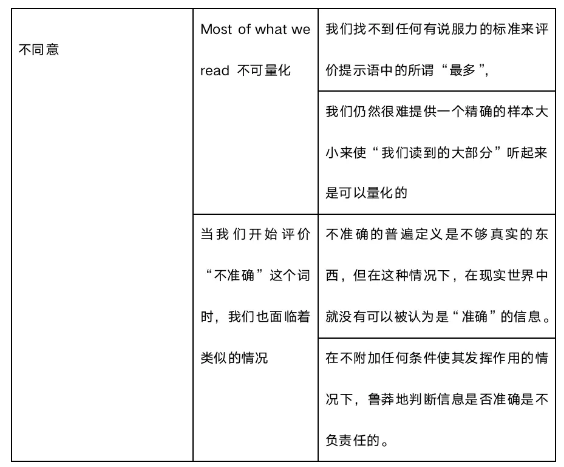Anyone can post information on the Internet. Some people say most of what we read on the Internet is inaccurate. To what extent do you agree or disagree?
题目大意
任何人都可以在互联网上发布信息。有些人说,我们在网上读到的大部分内容都是不准确的。你在多大程度上同意或不同意?
写作思路解析
由于“我们读到的大部分内容”难以量化,而且“不准确”一词含糊不清,因此该题目的说法是毫无根据的。
要评估我们在网上读到的大部分内容是否不准确,首先必须提供有关数字的可信衡量。遗憾的是,题目中的表达很难满足这一要求。我们找不到任何有说服力的标准来评价提示语中的所谓“多”,其他词语也是如此。在日常表达中,人们可能会夸大他们对充斥着信息的互联网的感受,这些信息大部分可能是个人发布的,也可能由于作者本身的主观性而不那么准确。然而,一旦表达成为一种陈述,面对逻辑的审视,它就不再合理了。究竟我们读到的东西中有多少可以被认为是“多的”呢?与此相关的内容没有可信的答案。更重要的是,我们仍然很难提供一个样本大小来使“我们读到的大部分”听起来是可以量化的:我们无法计算出我们从互联网上获得的总信息量;它太多了,而且是零散的。
当我们开始评价“不准确”这个词时,我们也面临着类似的情况。不准确的普遍定义是不够真实的东西,但在这种情况下,在现实世界中就没有可以被认为是“准确”的信息。我们从任何一本书或通过其他平台学到的一切只有在一定的范围内才是正确的,比如其发表的时间、有效期和适用范围。因此,在不附加任何条件使其发挥作用的情况下,鲁莽地判断信息是否准确是不负责任的。这意味着,即使我们从互联网上得到的东西在面临某些验证时可能不是那么正确,但当我们没有做全面的分析时,仍然不能认为它是不准确的。对于一些信息来说,总会有一些情况是它经得起现实的考验的。
提纲梳理见下
写作示范
The utterance in the claim made by the topic is groundless because of the difficulty in quantifying "most of what we read" and the vagueness of the word "inaccuracy".
To assess whether most of what we read online is inaccurate or not, one must first provide a credible measurement of the relevant figures. Sadly, the expression in the rubric can hardly fulfill this requirement. We cannot find any persuasive criterion to evaluate the so-called "most" in the prompt; the same holds for the other words and phrases. In daily expression, it is understandable that people may exaggerate their feelings about the internet littered with information, most of which may be posted by individuals and not that accurate because of, say, the subjectivity of the authors. However, once the expression becomes a statement, facing the logical scrutiny, it is no longer reasonable. Just what proportion of what we read can be considered "most"? There is certainly no credible answer related to this. What is more, it is still hard for us to provide a precise sample size to make "most of what we read" sound quantifiable: we cannot figure out the total information content we have got from the internet; it is too much and fragmented.
We also face a similar situation when we start to evaluate the word "inaccurate". The universal definition of inaccuracy is something that is not true enough, but in that case, there would be no information that can be deemed "accurate" in the real world. Everything we learn from either book or other platforms is only correct within limits like, say, when the statement is made, the period of validity, and the scope of application. It is therefore irresponsible to recklessly give out the judgment of whether the information is accurate or not without attaching any condition or premise to make it work. That means, even though what we get from the internet may not be that correct when facing certain verification, it still cannot be deemed inaccurate when we haven't made a well-rounded analysis. For some information, there would always be cases in which it withstands the test of reality.
In conclusion, the vagueness of certain words and phrases in the claim that most of what we read online is inaccurate compels me to question the accuracy of it; one has to set clear criteria about the quantifications and to provide related conditions before making the judgment.


